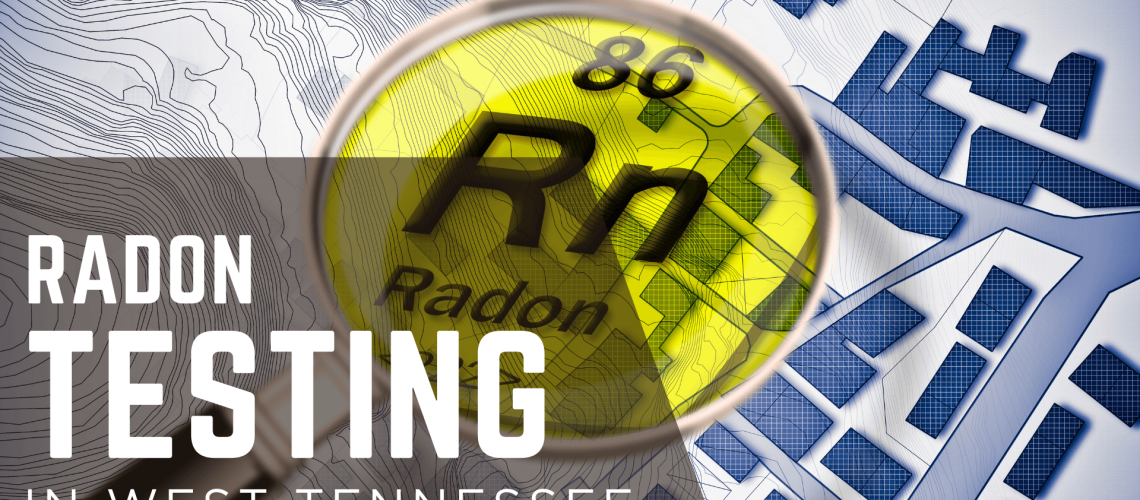If you’ve ever bought or sold a home in another part of the country, you’ve probably heard of radon testing. But here in West Tennessee, many homeowners assume it’s not something they need to worry about. Unfortunately, that assumption can be costly — because radon gas doesn’t stop at state lines, and it doesn’t follow anyone’s expectations.
Even though our region isn’t known for high radon levels overall, testing is still the only way to know whether your home is affected. I’ve personally seen radon readings in Jackson, Somerville, and Memphis suburbs that surprised both homeowners and agents. It’s invisible, odorless, and can vary dramatically from one house to the next — even on the same street.
What Is Radon, and Why Is It Dangerous?
Radon is a naturally occurring radioactive gas that forms when uranium in soil and rock breaks down. It moves upward through the ground and can enter homes through cracks in slabs, gaps in foundations, sump pumps, or even well water.
Once inside, radon can build up in enclosed spaces, especially in basements, crawlspaces, or lower living areas. Long-term exposure to high radon levels is the second leading cause of lung cancer in the United States, according to the Environmental Protection Agency (EPA).
You can’t see, smell, or taste radon — so without testing, there’s no way to know if it’s there.
Why Test for Radon in West Tennessee?
While some parts of the country have well-documented radon “hot zones,” Tennessee’s geology is varied. The EPA’s radon map designates parts of West Tennessee — including Hardeman, Fayette, and Madison Counties — as moderate-risk areas (Zone 2). That means average readings between 2 and 4 picocuries per liter (pCi/L).
Even so, I’ve tested individual homes that exceeded 4.0 pCi/L, the EPA’s recommended action level. That’s why relying on county averages or neighbors’ results can be misleading. Every home is different, and factors such as soil composition, foundation type, ventilation, and even remodeling work can influence how much radon seeps inside.
In short: the only reliable answer comes from testing your specific home.
How Professional Radon Testing Works
At Upchurch Inspection, I use continuous electronic radon monitors or lab-analyzed charcoal canisters, depending on the home and testing duration. The devices are placed in the home’s lowest livable level for a minimum of 48 hours, collecting air samples that measure radon concentration.
Once complete, results are analyzed to determine average levels and whether mitigation is recommended. Reports are detailed and easy to read, showing hourly data and final averages — not vague readings or estimates.
Testing can be added to your home inspection or performed as a standalone service for current homeowners.
When to Test for Radon
- Before buying or selling a home — to ensure safety and avoid surprises during negotiation.
- After major renovations or additions — new construction can change air movement and soil contact.
- If you use a basement, crawlspace, or lower-level room as living space.
- Every 2–5 years as part of routine home health checks, especially if your foundation type or ventilation has changed.
Even if your home previously tested low, seasonal and structural changes can alter radon entry pathways over time.
What If Your Home Tests High?
If your radon levels exceed 4.0 pCi/L, the solution is often simple. A certified mitigation contractor can install a venting system that draws gas from beneath the foundation and safely releases it outdoors. These systems are effective, quiet, and unobtrusive — and they can dramatically reduce indoor radon levels in just days.
The key is to test first and act based on data, not assumptions.
Protecting Homes Across West Tennessee
Radon doesn’t discriminate by ZIP code or property type. Whether you live in a new subdivision in Arlington, a country home near Bolivar, or a historic property in Jackson, testing provides peace of mind and documented assurance that your air is safe.
At Upchurch Inspection, I make radon testing simple and affordable. Every test is performed by a trained professional, using accurate equipment and lab analysis you can trust.
📞 Schedule Radon Testing in West Tennessee
Serving Jackson, Somerville, Bolivar, Arlington, and the greater Memphis area, Upchurch Inspection provides certified radon testing, mold inspection, water quality testing, and complete home inspection services.
📞 Call (901) 350-8885 or visit UpchurchInspection.com to schedule your radon test today.


